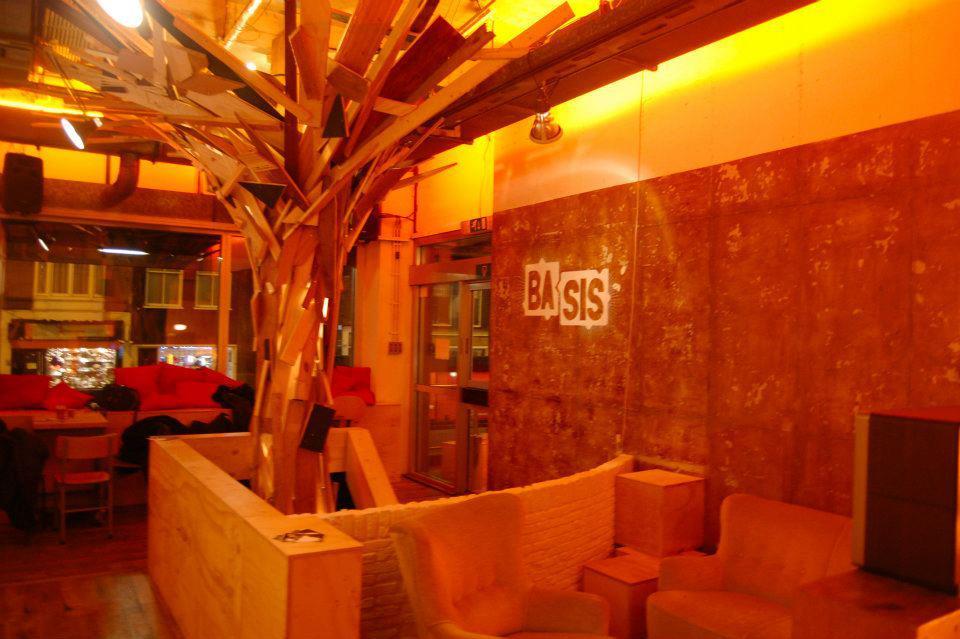Dutch Economy: ‘We’ll Even Do the Dishes for You’
Basis Bar (Photo: courtesy of Basis Bar)
I was recently in the Netherlands reporting a story about the economic and political woes the country is currently feeling. Seven long weeks of protracted political negotiations (“That’s a long vacation!” as some Dutch comedians put it) to come up with an austerity plan ended when Geert Wilders of the populist, far-right Freedom Party said he couldn’t in good conscience make the Dutch people suffer through austerity. That move brought down the government, and until elections are held in September, the country will be run by a caretaker prime minister and cabinet.
With these slightly shocking events, there was flurry of journalistic interest in the Dutch economy. Was it tanking? Is it the next domino to fall? What happens if one of the eurozone’s strongest core members falters? Is this the end of the euro?
Journalists all ran around Holland looking for signs that the economic end was nigh for the Dutch. We went to food banks, which indeed have seen an increase in the number of people asking for assistance. We looked for other places, other situations, that would prove dramatic examples of “just how bad it is these days” in the Netherlands.
One place many of us ended up is the Basis Bar in Amsterdam. Why? Well, probably because the Basis Bar has a very particular schtick. You can bring your own food; bring it from home, pop over to the supermarket across the street and get a frozen pizza, or even have a local restaurant deliver your meal to the bar.
“We provide all the necessities that you need for eating here. Plates, cutlery, microwave oven. We even do the dishes for you if you ask us nicely,” joked co-owner Jan Schaberg. The assumption, of course, is that the “bring your own” idea is somehow related to worsening economic conditions.
But, you’d be wrong. It was just the idea that the owners had to make the place more like your living room, and less like a traditional bar.
“It had nothing to do with the crisis,” Schaberg said. “But,” he admitted, “four months in it is proving to be a selling point. If you want to go out to have dinner in a restaurant, you’ll go quickly up to $40 or $50 per person. And with us, you pay for your drinks, and if you pay for a pizza at the supermarket, it’ll cost you six bucks. So yeah, the financial factor is bigger than we thought it would be.”
Still, Schaberg told me, they have no intention of changing the way they advertise the place. I asked him if he thought it was getting tougher for young people to find and keep jobs. He said yes, but cautioned that it’s nothing compared to Spain, Greece or Portugal.
“Everyone is still going out, and buying things,” Schaberg said.
While at the Basis, I also met up with Denise Dulcic, a young Dutch woman who I had seen profiled in a couple of different media outlets. When I emailed her, she cautioned me that she had been misquoted numerous times, and she insisted on seeing which quotes I was going to use.
Unlike what I had read about Dulcic, she actually hadn’t lost her job because of the financial crisis. Instead, two years ago, her contract ended as a child-care worker and she decided to start her own business by focusing on something she loved to do – cook.
But it hasn’t been easy for her.
She told me about going to the bank to ask for a loan to help out with the business. “They really had a laugh,” she said. “The bank told me, ‘All these restaurants and bars, they can’t all survive at this moment. So, why you?'”
Dulcic told me that things are difficult now for young people who are trying to break into the job market, or who are trying to be entrepreneurial. I asked her if she thought the upcoming elections in September would change anything.
“No,” Dulcic said. “Because you know they talk a lot, promise a lot. And then what happens? Nothing.”
